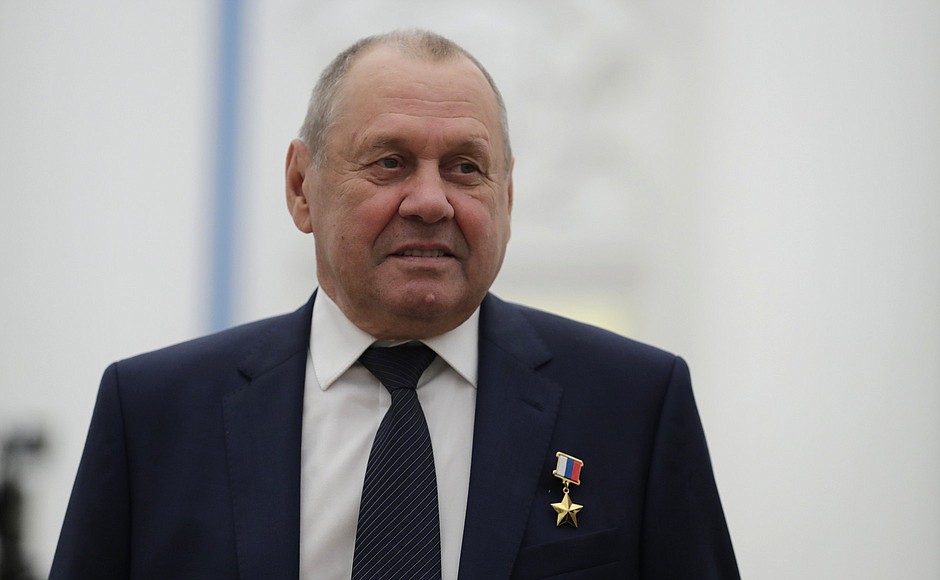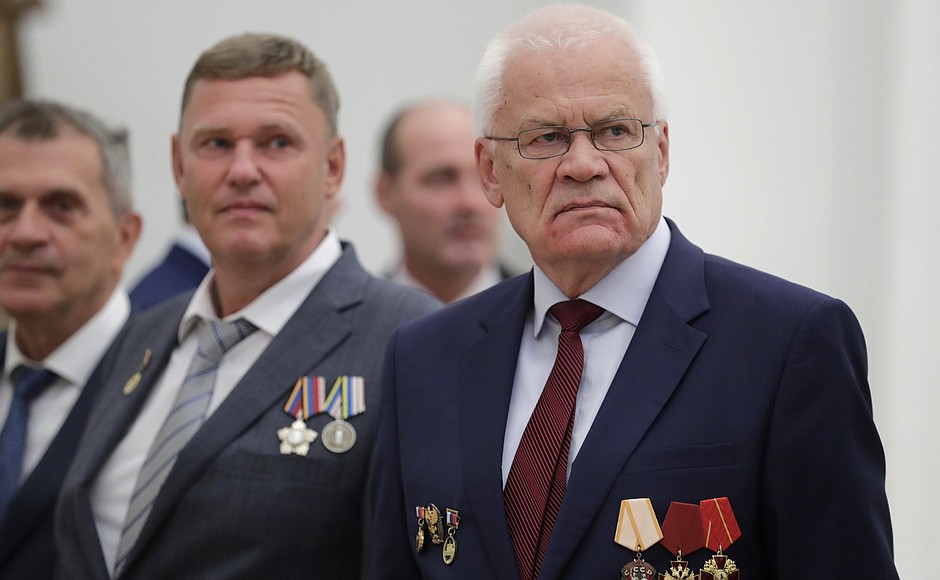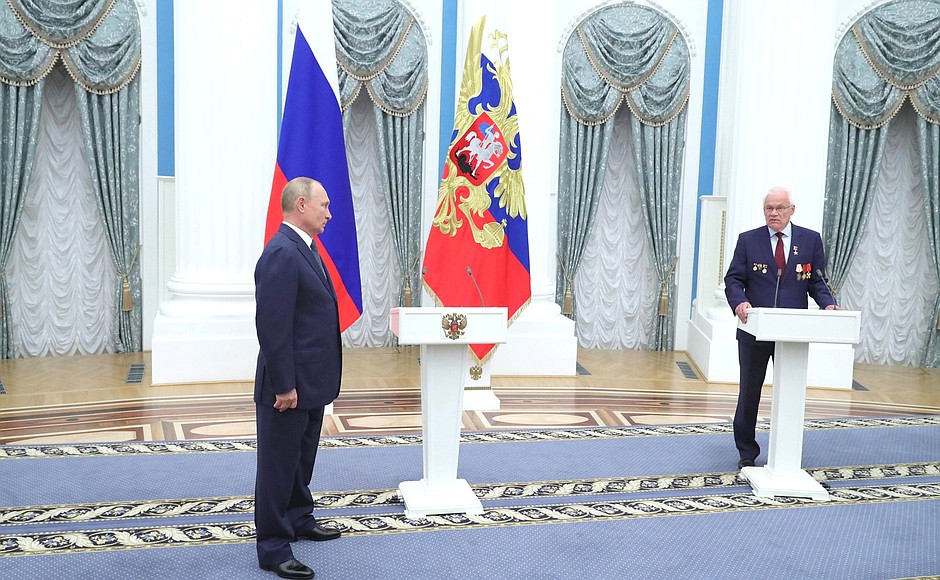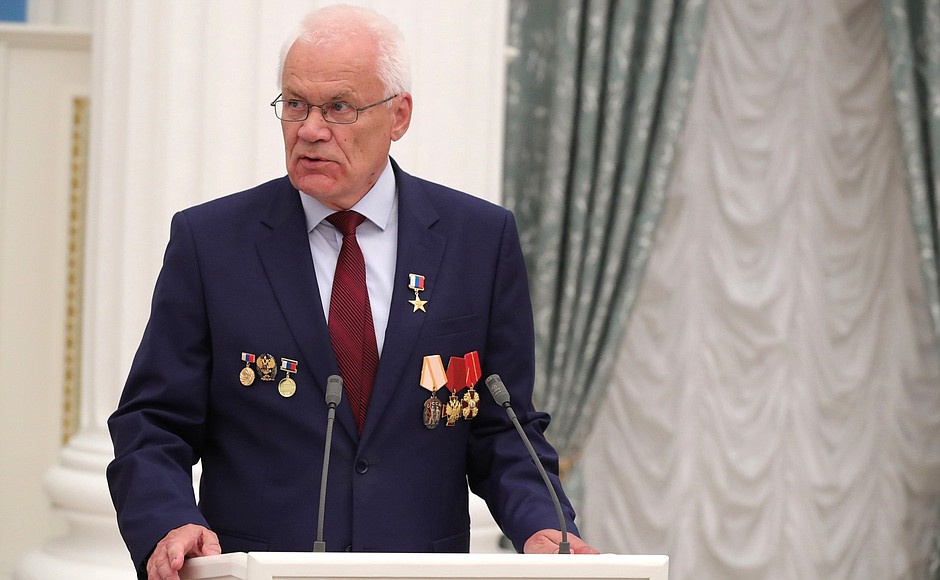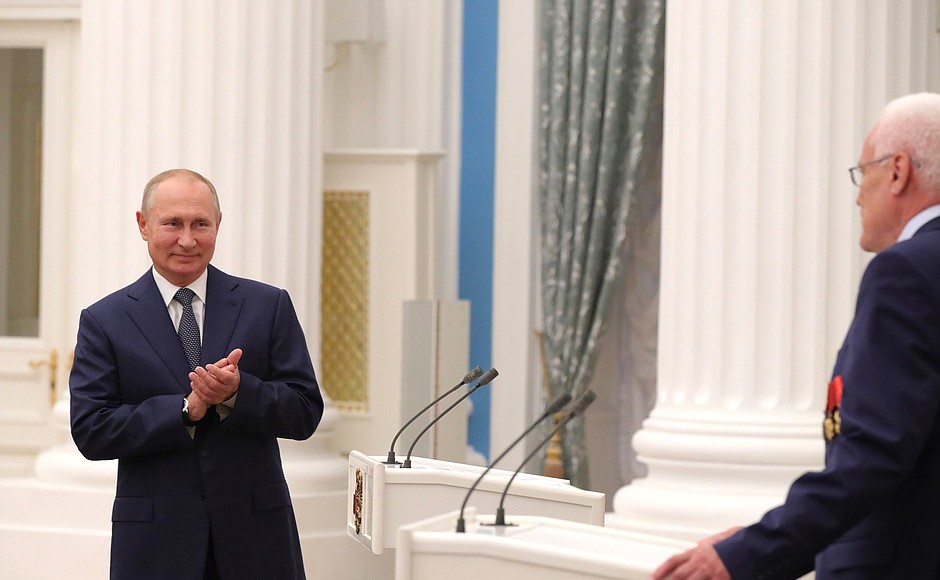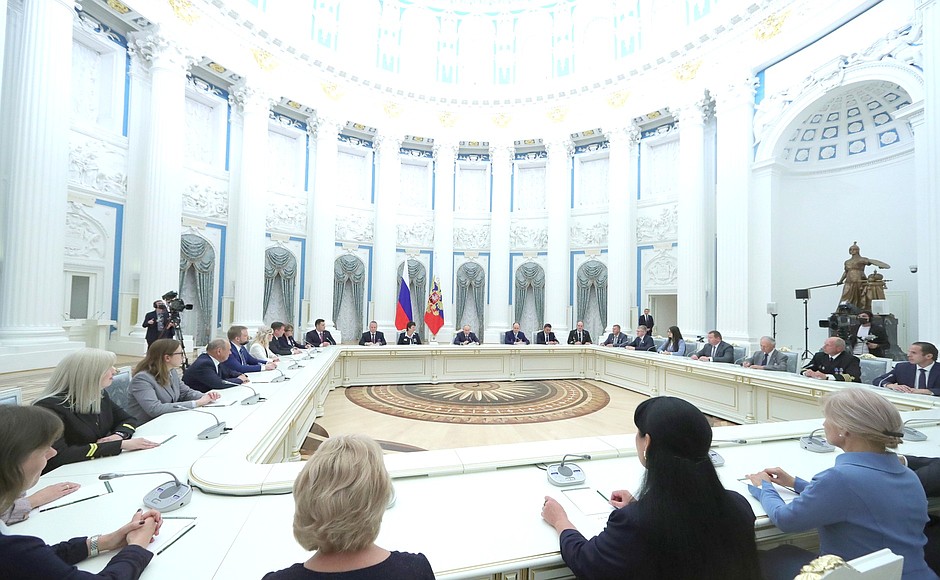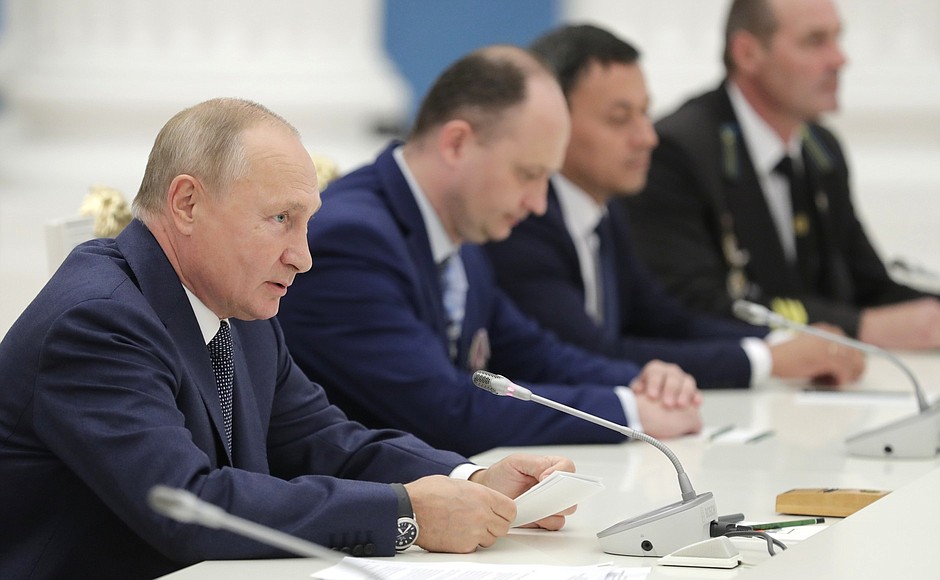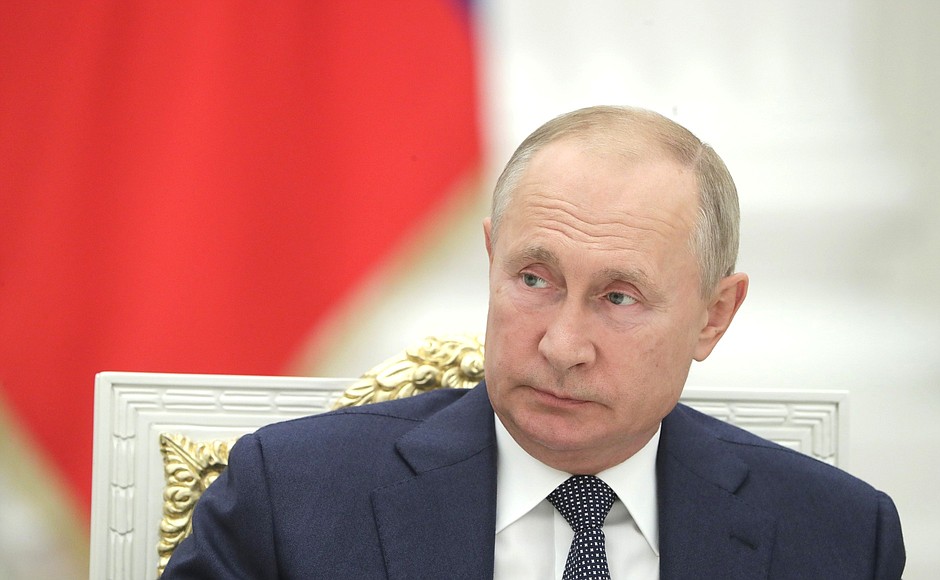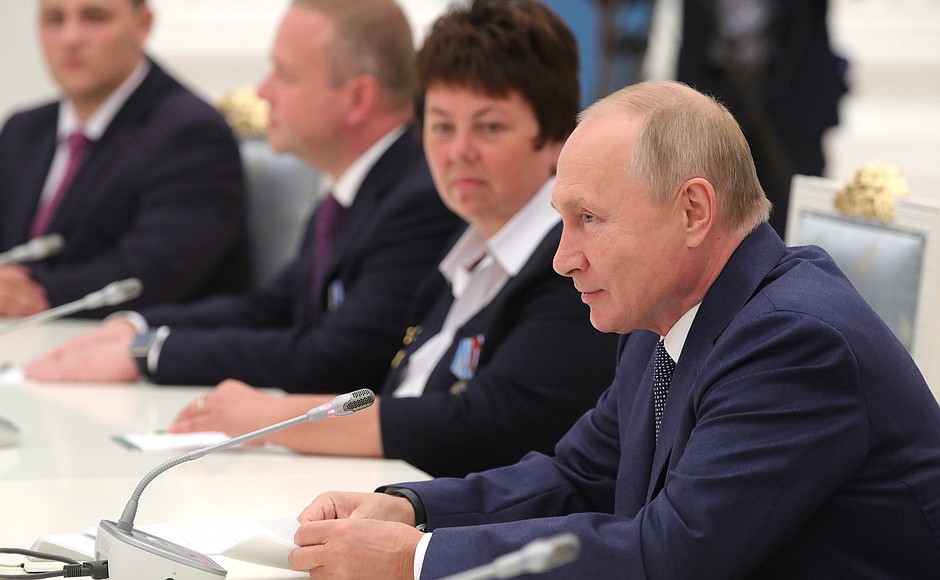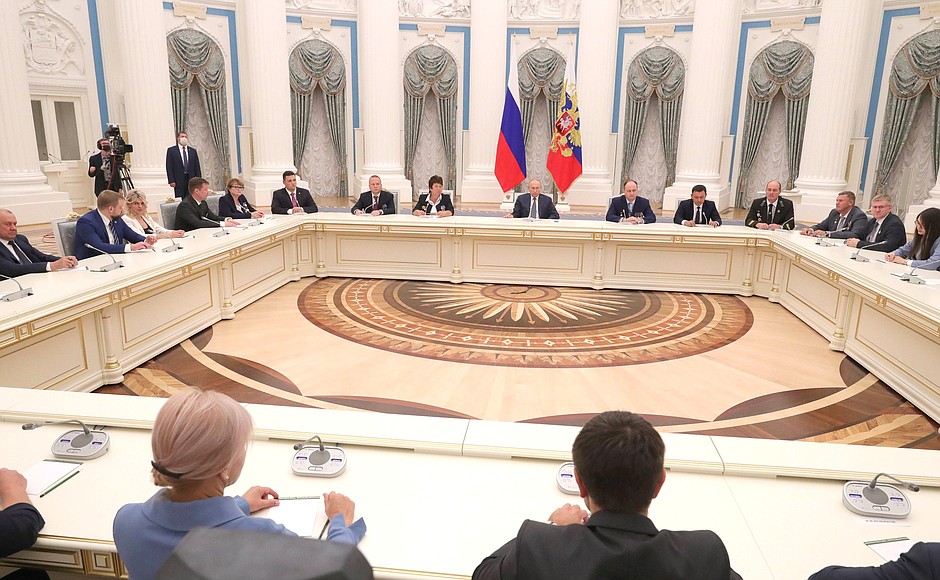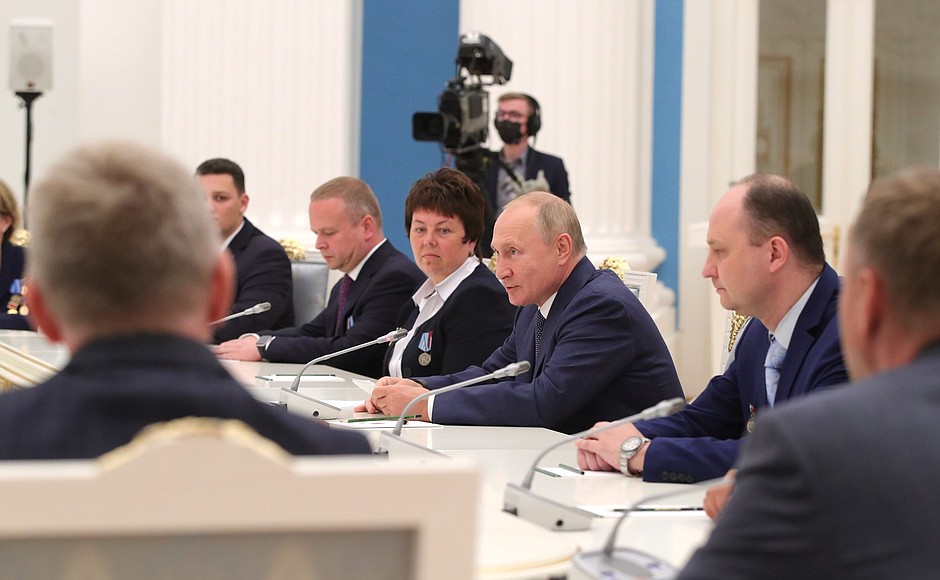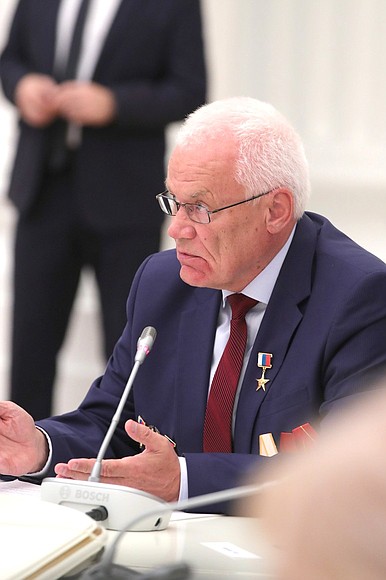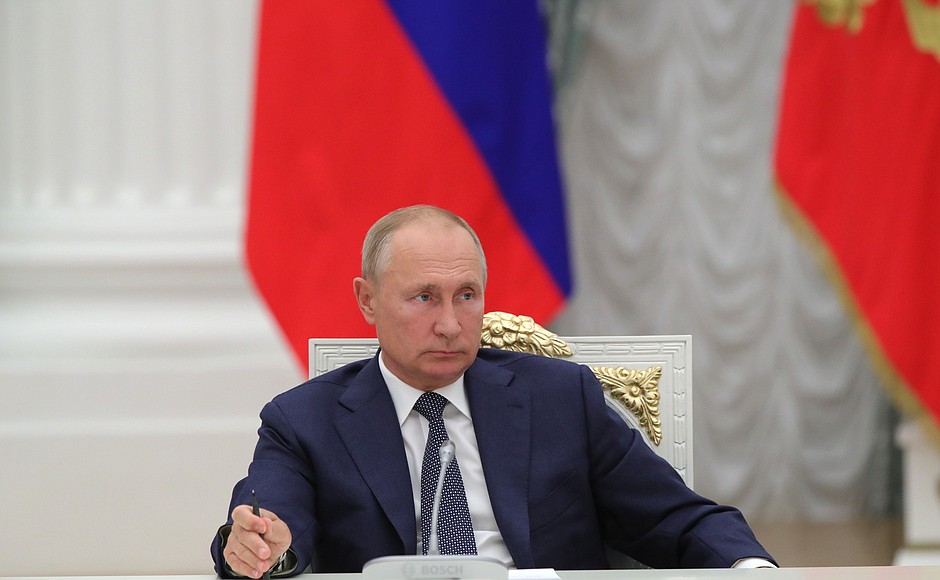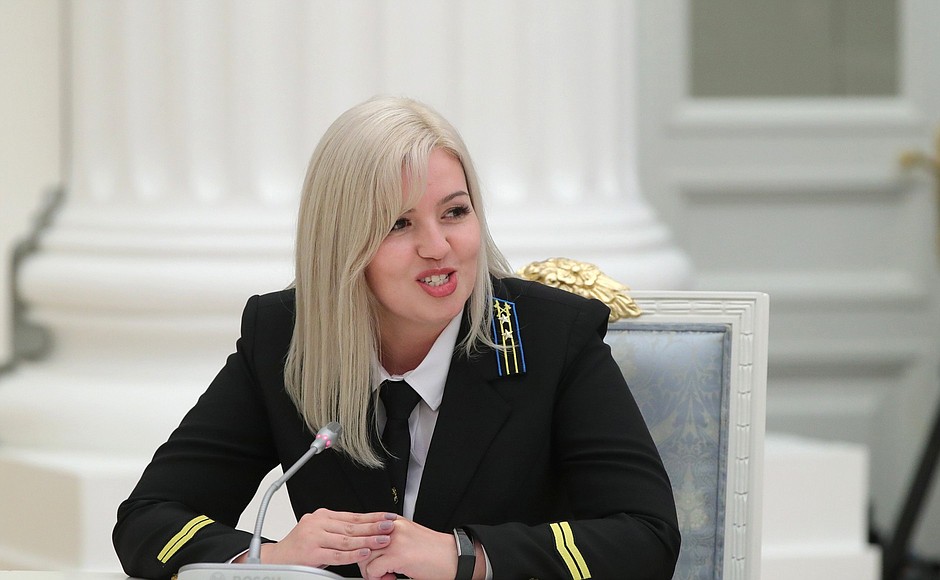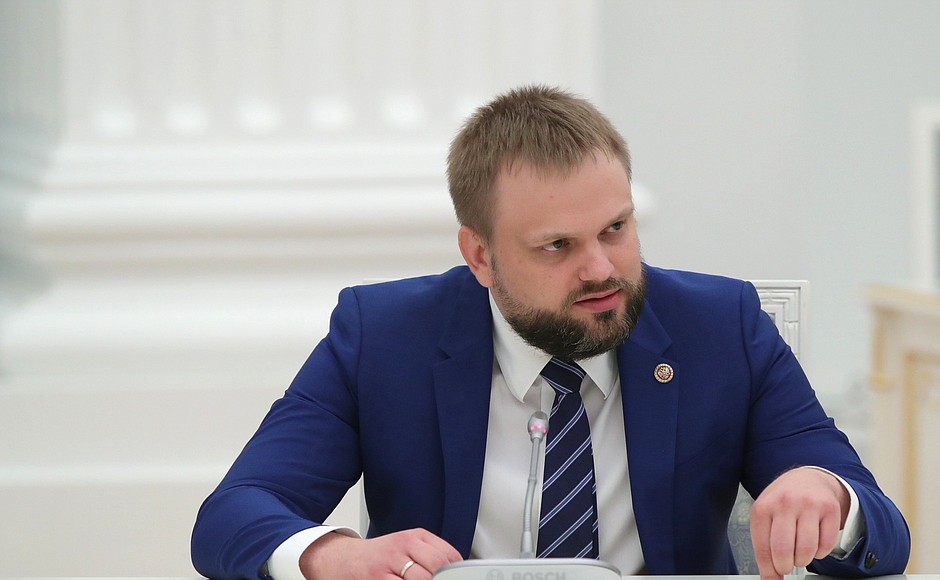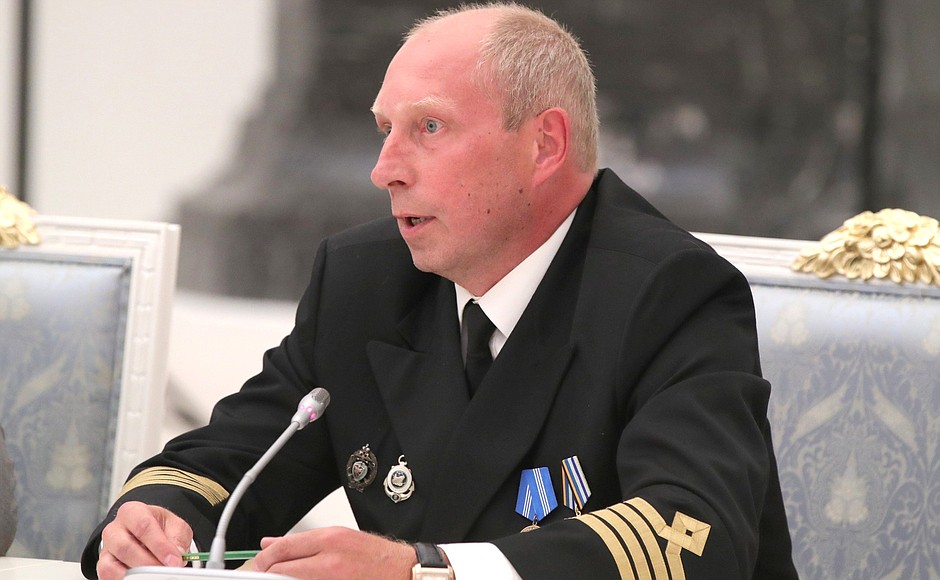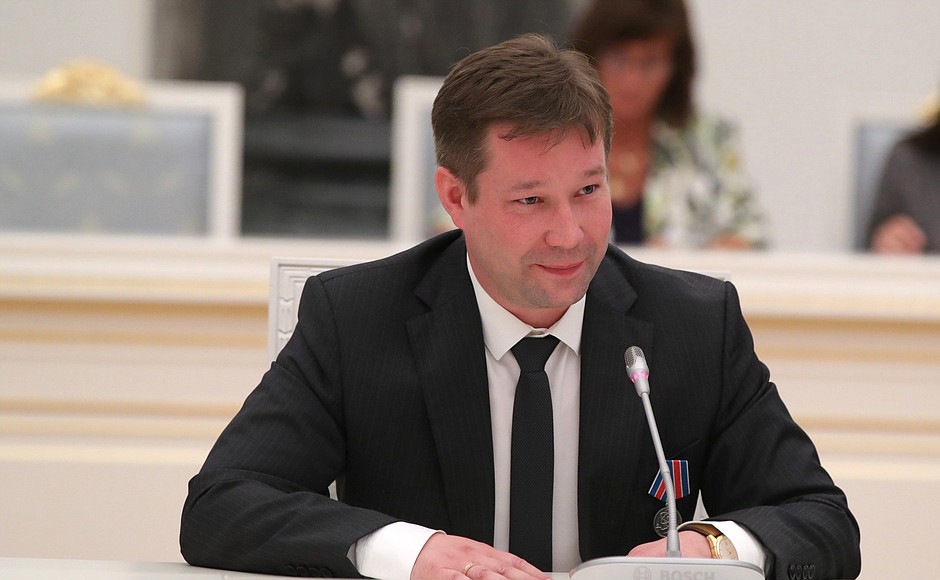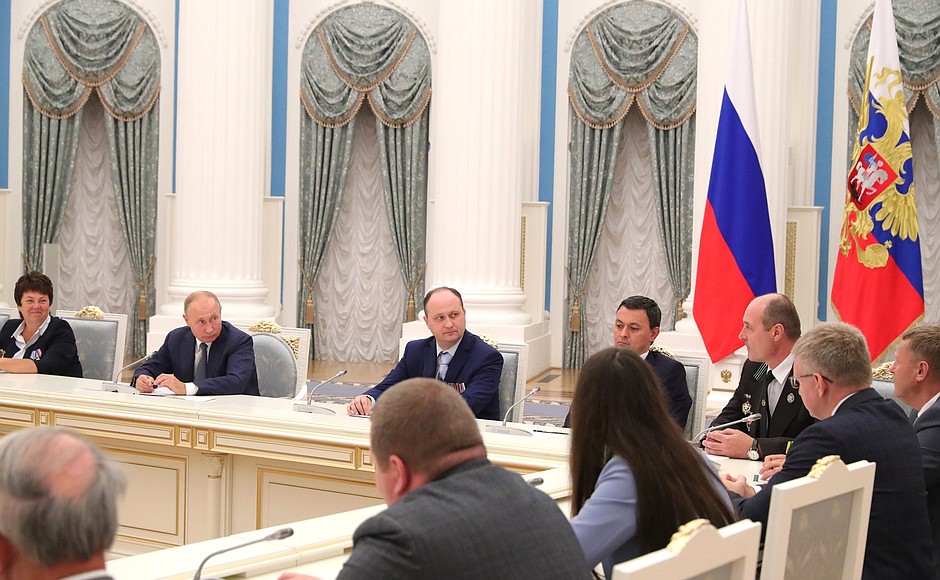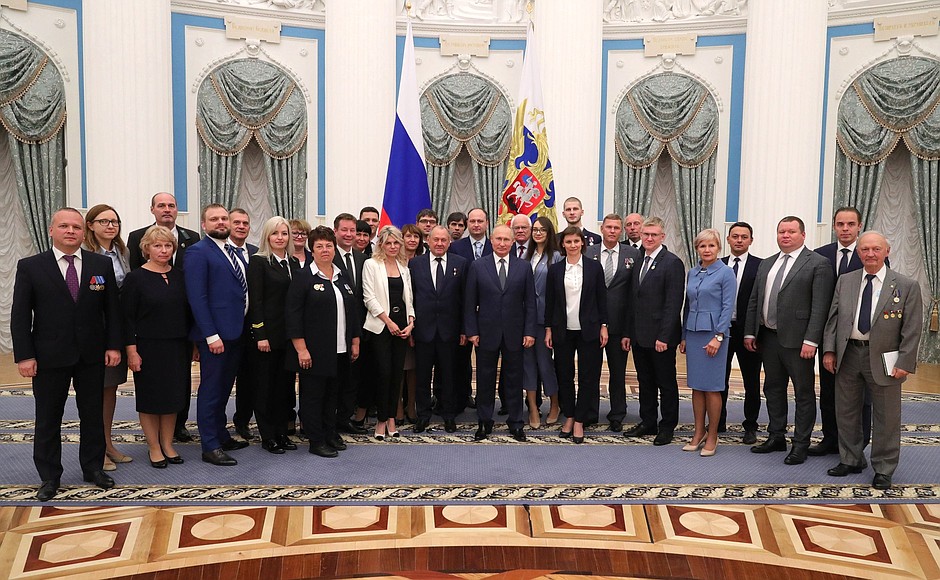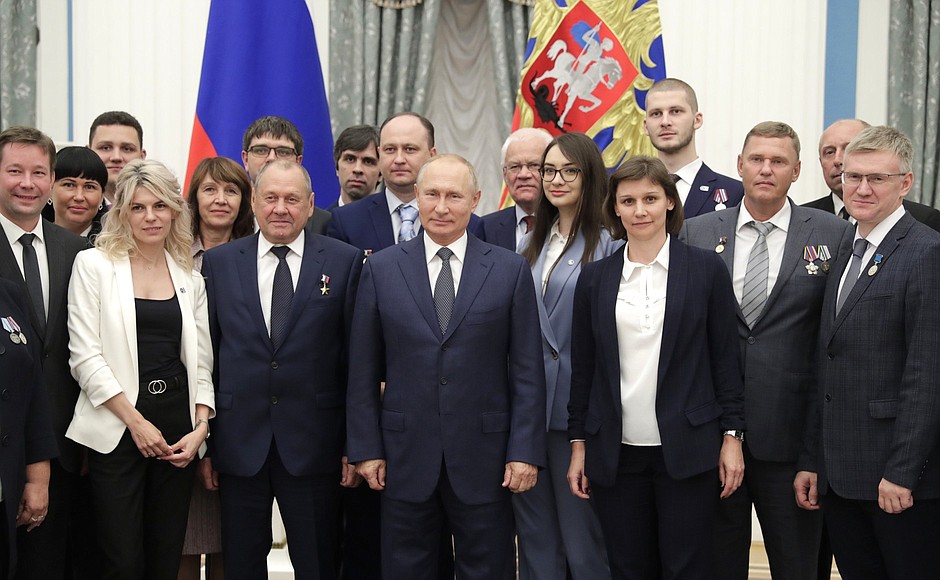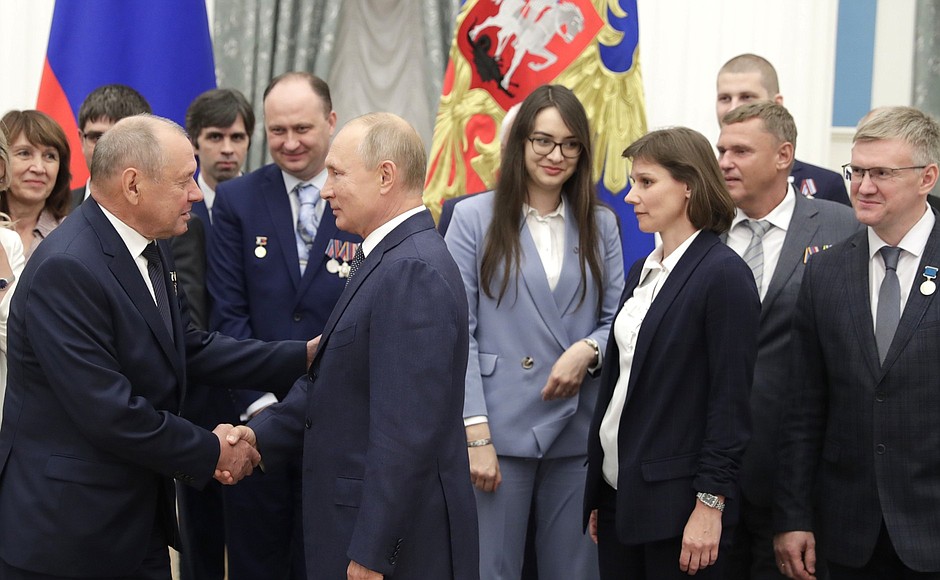Before the meeting, the President presented the star of Hero of Labour to Georgy Rykovanov, research advisor of the Russian Federal Nuclear Centre – Zababakhin All-Russian Research Institute of Engineering Physics. The ceremony took place at the Kremlin’s St Catherine Hall.
* * *
President of Russia Vladimir Putin: Good afternoon, friends,
Before we sit down and start talking, I would like to personally congratulate your colleague, outstanding physicist Georgy Rykovanov, on receiving the title of Hero of Labour of the Russian Federation. You are well aware of who he is and his achievements. He is a Doctor of Science, academician and a specialist in a number of research areas, including thermonuclear fusion. Mr Rykovanov is a research advisor of the Russian Federal Nuclear Centre – All-Russian Research Institute of Engineering Physics in Snezhinsk and successfully works with critical issues in civil and special military areas.
Mr Rykovanov, let me present you with this high award for your special labour services and major contribution to improving our country's defence capability.
Georgy Rykovanov: Mr President,
I am grateful to you for the high assessment of Rosatom’s nuclear weapons complex performance. We have always achieved the goals you have set for us. This year, despite the challenging circumstances, the nuclear weapons complex did not stop working for even a day. We will complete the state defence order assignments and the assignments set in your executive orders.
I must say that thanks to your attention and – I want to emphasise this – your control, the nuclear weapons complex has regained its balance, and is operating based on its own research, experimental, design and production base, and will remain the guarantor of our country’s security.
Thank you once again.
Vladimir Putin: Once again, I congratulate your colleague and invite you all to sit down so we can continue our conversation in a less formal setting.
Please go ahead.
* * *
Friends,
We are meeting just before Nuclear Industry Worker Day. I believe I signed the executive order establishing this professional holiday in 2005. Congratulations on this upcoming professional holiday to you and all your colleagues in the Russian nuclear industry– scientists, researchers, engineers, and workers – everyone who chose to pursue this career and this profession, who have devoted their lives to this amazing, wonderful, difficult, sometimes dangerous work, which is so necessary and so forward thinking. I believe it will always be this way. The industry will change, but it will still be at the leading edge.
It is certainly a symbol of scientific audacity, daring, selflessness, and sometimes personal courage and heroism. Unfortunately – I am saying “unfortunately” because the industry has seen tragic events; we have witnessed episodes that we all know about.
I would like to thank everyone for their great dedicated work, for their loyalty to their job and the traditions that were established by their predecessors. Three quarters of a century ago, without exaggeration, they accomplished a great deed, defended their Fatherland, achieved a true revolution in science, technology and industry.
Back then, in extremely difficult historical conditions, they made a leap in the shortest possible time from theoretical research to the practical use of their projects in the interests of Russia’s security and socioeconomic development. What they did is still amazing in its scale, meaning, and depth.
It took them only a few years to cover the distance from formulating an extremely difficult and unprecedented task all the way to testing the first working model of a nuclear weapon, the RDS-1 bomb, in August 1949.
At that time, without exaggeration, the entire country worked for that result, having barely emerged from a terrible world war with its daunting consequences. The people involved in the atomic project did not spare themselves either. They worked as if they were still at war. The government, realising the importance of what they were doing, provided everything that was needed, literally the shirt off its back, to address this urgent task.
You probably know the story, for sure, it is popular in the industry, and your colleagues gave me the phrase from those years: if atomic scientists need mercury, pharmacies will run short of thermometers. They gave everything, this is how it was.
Without the right to make a mistake, the research teams under the leadership of Igor Kurchatov explored several projects at once, and their technological achievements also pushed forward other industries that were more or less closely related to the atomic project: the rocket industry and space exploration. Moreover, an entire new industry grew out of it – civilian nuclear energy.
I would also like to note that our nuclear industry survived and didn’t really even decline in the 1990s during those very difficult years for our country and people, when many institutions collapsed and there was a threat, a real threat of losing our scientific schools, personnel and the foundation of this industry.
We managed to avoid these threats, importantly, due to the faith, perseverance, patriotism and self-sacrifice of those who worked in the industry during those crisis years, during such a difficult time for the country. Those who were working then know what I mean.
The industry is undoubtedly on the rise as it marks its 75th anniversary, with excellent results and new achievements that are important for the country, with improving indicators in the key areas of your activities.
I believe you will be speaking about them yourself. I have seen our plan for today, a whole number of speeches. I will listen to you with great pleasure.
Of course, we are very happy with what Rosatom is doing in a number of areas. I mean the further development of emission-free nuclear energy including the introduction of next-generation reactors, and also the new nuclear icebreakers, the development of the latest digital platforms and a range of innovative products for a variety of applications.
I know that Rosatom is working in a multitude of core and related areas – from new materials research to environmental protection and hazardous waste recycling.
And undoubtedly, we will do everything we can to further strengthen our international contacts. As for me, as our colleagues know, I am doing everything I can to support your international activities.
There is no doubt that the unique scientific and creative potential accumulated in the nuclear industry will be a basis for new successes and achievements and a constant and powerful inflow of young people will provide the necessary continuity in the work.
I can see that this industry has become prestigious again. It has always, no doubt, been interesting, but it has become prestigious and exciting again. I am very happy that young and talented people are attracted to it again.
What else can I say? Many of your colleagues, including some very young specialists, are taking part in strengthening national defence and contributing to the projects related to prospective weapons, displaying not only high professionalism but also personal courage, as I mentioned earlier.
I talked about strategic systems recently; I alluded to them on Gunsmith Day when I greeted our weapons makers.
Well, let’s begin.
<…>
